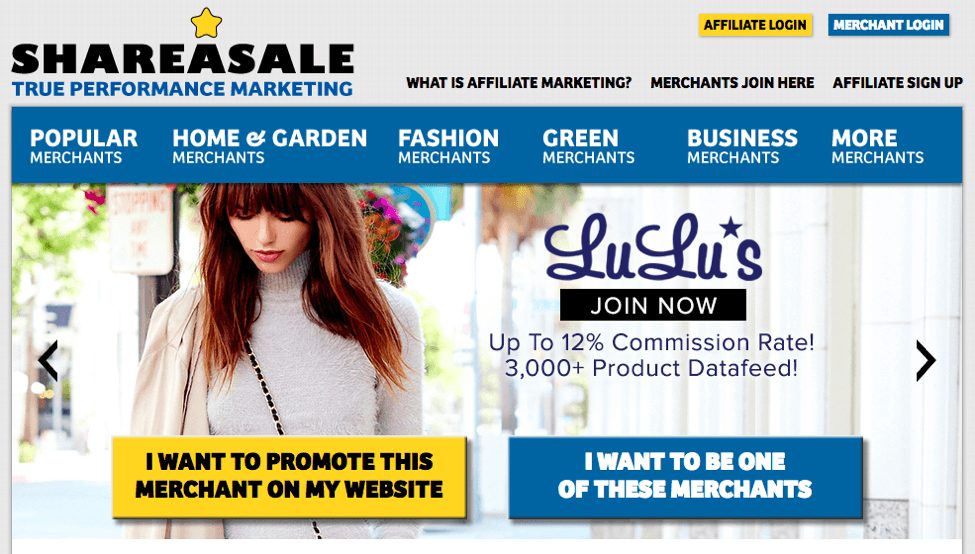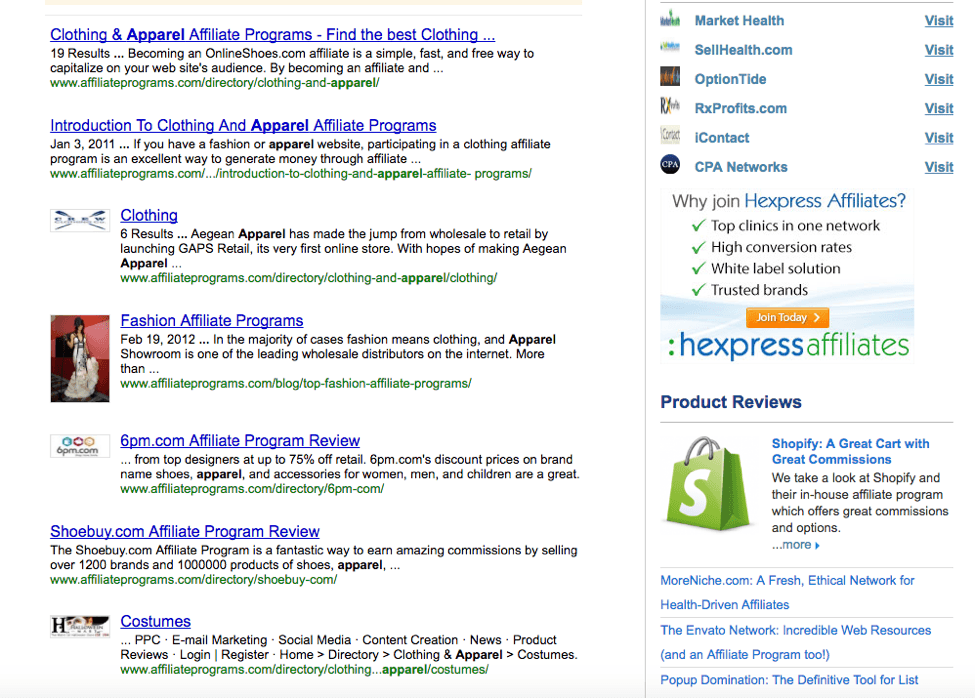Getting sales when you’re first starting your ecommerce business is tough.
You need to make a profit so that you can reinvest it in generating traffic in order to grow. The catch, however, is that you need traffic so that you can earn revenue and turn a profit in the first place. If you’re trying to use Facebook ads or other forms of paid traffic, you might not always get enough sales to make up for that investment.
As you’ve researched and explored different solutions to this dilemma, you’ve probably seen the term affiliate marketing thrown around quite a bit. At this stage in your business you might be asking yourself, ‘What is affiliate marketing?’ This article on affiliate marketing for beginners will explain all the ins and outs of this important component to driving sales, and it will give you all the necessary information with regard to how to start affiliate marketing. After you read it you’ll not only have the necessary tools to know how to start affiliate marketing, you’ll also be exposed to some of the best affiliate programs of 2021.
What is Affiliate Marketing?
Before we can adequately explain how to start affiliate marketing, however, let’s first examine the concept in more detail. What is affiliate marketing? Affiliate marketing involves partnering up with a more established ecommerce entrepreneur in your niche and asking them to promote your products to his or her audience. In return, you’d give the affiliate a percentage of revenue from each sale he or she generates. Affiliate marketing can be a great channel for first time ecommerce entrepreneurs because it’s one of the only marketing channels where you can get a 100% return on investment, every time.
Many of us have gotten burned at some point through paid traffic. We invest money in Facebook ads and drive people back to our sites, but we don’t always get the sales we need to foot the bill. With affiliate marketing, on the other hand, you can rest assured that all your revenue can be pure profit because there’s no required up front investment since affiliates are paid through commissions.
Now that we’ve covered what affiliate marketing is, you’re probably wondering just how to start affiliate marketing as part of your advertising strategy.
How to Start Affiliate Marketing
In the remainder of this post on affiliate marketing for beginners, I’ll show you how to implement and create your own ecommerce affiliate program. In addition, you’ll learn how to partner with the right affiliates and how much to pay them in commission.
Get an Affiliate Tracking System
There are two ways to implement an affiliate marketing strategy: either join an affiliate “network” or build your own tracking system.
Affiliate networks, often considered among some of the best affiliate programs, are marketplaces where ecommerce entrepreneurs can find affiliates to promote their products. While these networks make it a bit easier to find affiliates, some also charge monthly fees, which might not make them as suitable for early stage entrepreneurs. Others take a cut of your sales, which still gives you guaranteed positive ROI as a store owner. Some affiliate networks include Share-a-Sale, Tapgerine, Commission Junction, AffiliatePrograms.com, and LinkShare.


Find an Affiliate in Your Niche
Now that you understand the main forms of affiliate marketing, the next step is to find affiliates for your ecommerce affiliate program who will promote products to the right audience of potential customers.
When it comes to the best affiliate program, affiliate networks are a great start for those new to this marketing channel. Affiliate networks provide you with their own tracking systems, which makes it easier to start affiliate marketing for beginners because they facilitate contacts with affiliates appropriate to your niche. Using an existing affiliate network also helps both affiliates and entrepreneurs track how much in sales they’re generating. That way, you and your affiliate know exactly how much money he or she brought in for your business and how much commission he or she should be paid. Tracking systems provide a special sales link for the affiliate to track revenues that they brought in.
Another option is to build your own tracking system and ecommerce affiliate program, which, in actuality, isn’t as complicated as it sounds. There are a range of free apps for affiliate marketing on Shopify. In addition to paid apps on Shopify, which you use to set the foundation for your affiliate program, there are also plenty of with other helpful plugins. Even paid apps come with a lengthy free trial period so you can test out your affiliate program, make sure that you get a good return on investment, and then decide which apps are worth your money.
To summarize, the benefit of using an affiliate network to find affiliates suitable to your product niche is that you already have access to a pre-built audience of quality affiliates, ranking them among some of the best affiliate programs. The perk of creating your own ecommerce affiliate program, on the other hand, is that you have more control over it and will likely pay fewer fees. Keep in mind that the downside of creating an ecommerce affiliate program from scratch is that you’ll need to find your own affiliates, which can be a challenging aspect of affiliate marketing for beginners. Fortunately, if you already have a substantial customer base, you can also allow your customers to be affiliates as influencers, a common trend on blogs or platforms like Instagram. This can even help turn them into evangelists for your brand.

If you’re using an affiliate network, the right affiliates will be able to easily find you through the built-in search feature. For example, a simple search for the word “apparel” on AffiliatePrograms.com produces a variety of search results about the best affiliate programs for 2021 under that category, along with reviews. Also, feel free to niche down your search into ‘running’ or ‘crossfit’ to pinpoint a few affiliates who understand your customer base well. They may have a blog that caters to your specific target audience.
Contacting an Affiliate in Your Niche
On the topic of looking for affiliates that cater to your niche, another way to bring on affiliates is by emailing other entrepreneurs in that niche as well. If you’re not using an affiliate program, finding other stores on your own that target an audience similar to yours and reaching out to them could be a great way to start a really profitable relationship.
For example, let’s say you just started a store that sells shoes. You might decide to reach out to the owner of a slightly more established store like ShoeBuy.com to see if they’d like to be an affiliate. You can also find complimentary websites. If you sell swimwear, for instance, you might partner with a sunscreen or sunglasses company.
Here’s a sample email script you can send to the contact email on a more established store’s website:
This email nails a few key things:
- It doesn’t ask for huge commitment up front. No one wants to sign up to be an affiliate partner for a site they’ve just heard of.
- It offers to send the potential affiliate a few product samples. If you’re not using an affiliate network, you’d need to put in a bit more work to build trust with your affiliate so that they know you’re legit. Sending sample products is a good way to do that.
- It mentions that you’d offer generous commissions. The better commissions you offer, the better the affiliates you’ll be able to get. We’ll talk about this more next.
Determine Your Ecommerce Affiliate Program Commission Percentage
One thing you should do first before starting your affiliate marketing plan is set your default commission rates. While these can still be customizable from one affiliate partnership to another, establishing your rates will help you budget in addition to influencing who and how you will approach the potential affiliates.
To build on that last point about commissions in the previous section of this post, it’s important to offer generous commission rates, especially if you’re just starting out. For example, proven top fashion sites offer commissions of up to 10%, and some early-stage stores would benefit from offering even more. When it comes to affiliate marketing for beginners, providing great monetary incentives is a key way to build trust and scale up your advertising efforts by scoring great affiliates.
In fact, successful entrepreneurs treat their relationships with affiliates like gold. The more generous you are to your affiliates, the more they will want to sign up and sell your products. Thus, this means you’ll reach a much wider audience.
Yet, if you are still not sold on the payoffs of offering high commissions, remember that your affiliates are not just bringing you sales, they’re bringing you customers. You’ll have access to people who you can re-market to time and time again. Repeat customers have a 60-70% higher chance of buying from you compared to a first time customer, and they also give your store more word of mouth marketing. Thus, it’s best to do what you can to foster a strong, mutually beneficial business relationship with them.
In other words, you might have to pay higher commissions to get good affiliates up front. This strategy is an important aspect of cultivating the best affiliate program because you’ll make up for that cost through the lifetime value of each customer. Please note that while I certainly would recommend offering high commission rates, you still need to make a profit on your products so make sure to do your math and arrange your budget accordingly.
So you might be wondering which other kinds of specific factors you should consider when establishing your commission rates. Look at your commissions as an investment in the future of your business, and remember that affiliate marketing has a great rate of ROI.
It is also useful to consider whether your products have varying markups as you come up with your default commission rates. This is because you might want to incentivize your affiliates to generate more sales on products that are already earning you higher profits. If you want to create a set rate instead, you’ll want to find a percentage that takes your varying markup rates into consideration. Instead of creating a single set commission rate, some affiliate marketers opt for a tier system where different commission rates are assigned to different product categories.
Affiliate Marketing for Beginners: Conclusion
One of the best ways to virtually guarantee return on investment from your marketing efforts is by finding affiliates to market your products for you. Now that you have the knowledge to answer the common questions surrounding affiliate marketing for beginners, you can use it to create an additional stream of revenue for your business.
Further, you can use affiliate networks or free tools for affiliate marketing with Shopify in order to tailor the best affiliate programs to fit your needs. You can even set-up your own ecommerce affiliate program which can bring high quality affiliates on board who will sell your products for you. No matter which approach you choose to take, when it comes to the best affiliate programs available for your business, top results always come from the amount of effort you put in to ensure your affiliates have the resources they need to succeed.
Affiliate marketing can be a great way to build stronger relationships with customers and other businesses that you admire within your product niche. From these people, you can gain valuable insights into customer experiences surrounding your products and learn new strategies for growing your business. This is just a basic template for how to start affiliate marketing. Now, it’s time to try it out for yourself. We’re sure that once you get the hang of it, you’ll come to realize that the sky’s the limit when it comes to making the most out of this lucrative marketing channel.
Want to learn more?
- How I launched my eCommerce store in less than 30 minutes (with products)
- How To Select Dropshipping Suppliers
- 10 Online Stores to Use as Inspiration for Your First Store
- The Definitive Guide to Affiliate Marketing [EBOOK]
How do you plan on getting your first affiliate? Leave your answer in the comments below.



